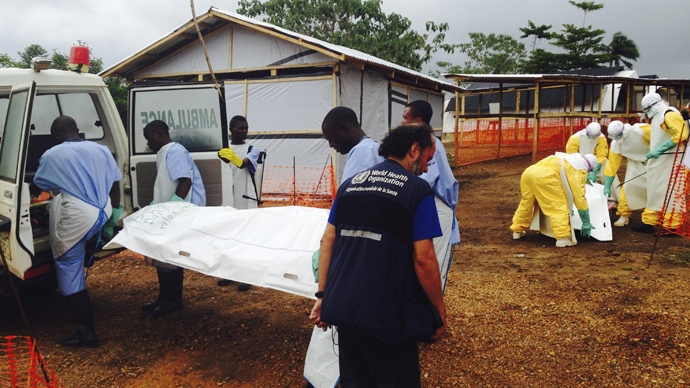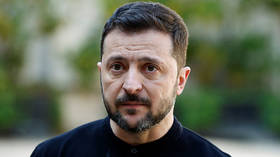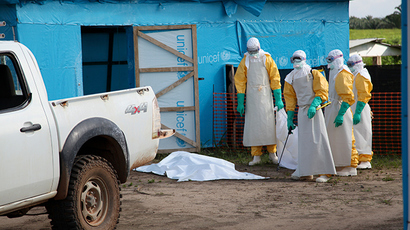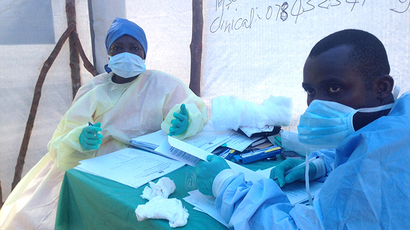FDA eases restrictions on experimental Ebola drug as CDC warns of 'inevitable' spread to US

While Ebola, the deadly disease spreading through parts of West Africa, has no cure, specific treatment or vaccine, there are several experimental drugs being tested in US labs. Now the FDA has lifted its hold on one of those drugs.
The US Food and Drug Administration gave Tekmira Pharmaceuticals verbal confirmation that they modified the full clinical hold the regulatory agency had placed on the company’s experimental TKM-Ebola drug, enabling the potential use on Ebola patients, Tekmira said in a statement.
“We are pleased that the FDA has considered the risk-reward of TKM-Ebola for infected patients. We have been closely watching the Ebola virus outbreak and its consequences, and we are willing to assist with any responsible use of TKM-Ebola. The foresight shown by the FDA removes one potential roadblock to doing so," said Dr. Mark Murray, CEO and president of Tekmira.
"This current outbreak underscores the critical need for effective therapeutic agents to treat the Ebola virus. We recognize the heightened urgency of this situation, and are carefully evaluating options for use of our investigational drug within accepted clinical and regulatory protocols."
The company, in collaboration with infectious disease researchers from Boston University and the United States Army Medical Research Institute for Infectious Diseases, showed the drug’s ability to protect non-human primates from Ebola in preclinical trials in May 2010, Tekmira said.
A Phase I clinical trial ‒ the first step towards FDA approval ‒ began on humans in January. The agency then approved a fast-track designation for the drug in March, around the same time the Ebola outbreak began in Guinea, Liberia and Sierra Leone. It has since spread to Nigeria. According to World Health Organization figures published on Wednesday, there are over 1,700 suspected and confirmed cases of Ebola in the four countries, and 932 of those patients have died from the disease.
A different drug, ZMapp by Mapp Biopharmaceutical Inc., was used to treat two American aid workers who had contracted Ebola in Liberia. ZMapp, previously only known as “a secret serum,” has not been given the go-ahead to begin human trials yet, Forbes reported. It works by boosting the immune system to battle against Ebola. The treatment consists of antibodies from lab animals exposed to the virus.
After receiving a dose of the serum, both Nancy Writebol and Dr. Kent Brantly were transferred to Atlanta’s Emory University Hospital, near the US Centers for Disease Control and Prevention. Brantly, 33, who is an employee of the international group Samaritan’s Purse, also received a blood transfusion from a 14-year-old Ebola survivor, who had been under his care before. Both American patients appear to be improving, officials have said.
With the arrival of Ebola in the US via the two aid workers ‒ who remain in isolation in Atlanta ‒ CDC Director Tom Frieden told Congress that the disease will "inevitably" spread around the world due to global air travel, but that any outbreak in the US would not be large.
Frieden testified on the epidemic in front of the House Subcommittee on Africa, Global Health, Global Human Rights and International Organizations on Thursday. "It is certainly possible that we could have ill people in the US who develop Ebola after having been exposed elsewhere," he said in his testimony. "But we are confident that there will not be a large Ebola outbreak in the US."
As people who have traveled to West Africa and then return to or continue on to other destinations develop Ebola-like symptoms, such as fever and gastrointestinal distress, other nations have begun testing for the disease. On Tuesday, Great Britain announced a person in Wales was being monitored by health officials following a potential exposure to the virus.
On Monday, the US experienced its first scare. Mount Sinai Hospital in Manhattan performed tests on a male patient with high fever and gastrointestinal symptoms, the hospital said in a statement. He arrived in the emergency room Monday morning, and had previously traveled to one of the West African countries where Ebola has been reported. However, by the end of the day, officials confirmed the patient had not contracted the deadly disease.
"We are all connected and inevitably there will be travelers, American citizens and others who go from these three countries ‒ or from Lagos if it doesn't get it under control ‒ and are here with symptoms," Frieden said.
But that does not mean that the US will become the next battlefront against the disease, a CDC spokesman clarified after Frieden’s testimony.
"It is inevitable that people are going to show up with symptoms. It is possible that some of them are going to have Ebola," CDC spokesman Tom Skinner said, according to AFP.















